Unit 5 Poems Using language 写作讲解课件 新人教版选择性必修三
文档属性
| 名称 | Unit 5 Poems Using language 写作讲解课件 新人教版选择性必修三 | 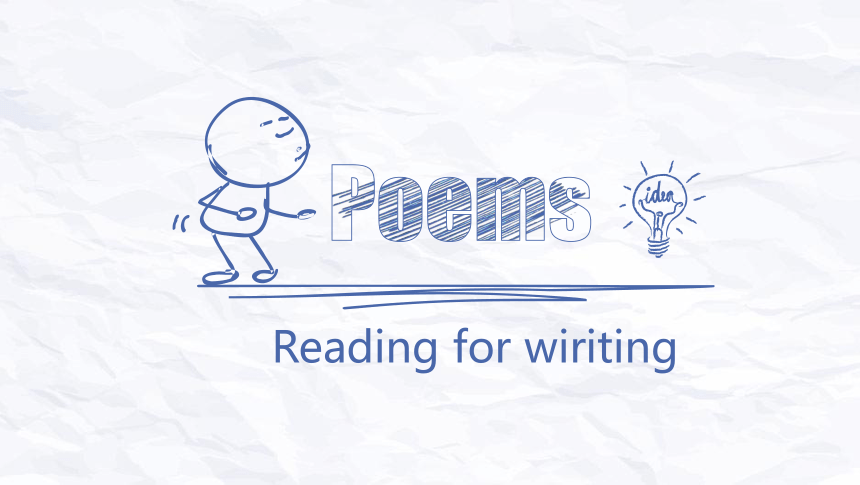 | |
| 格式 | zip | ||
| 文件大小 | 887.8KB | ||
| 资源类型 | 试卷 | ||
| 版本资源 | 人教版(2019) | ||
| 科目 | 英语 | ||
| 更新时间 | 2023-03-21 00:01:06 | ||
图片预览

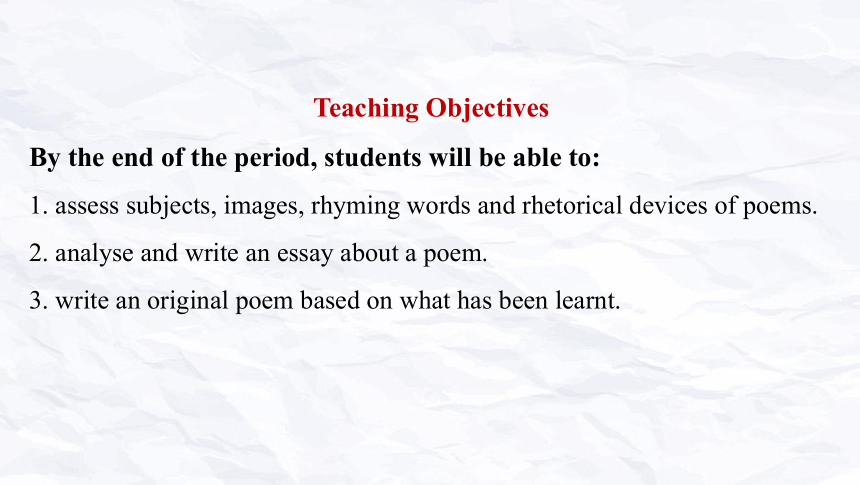
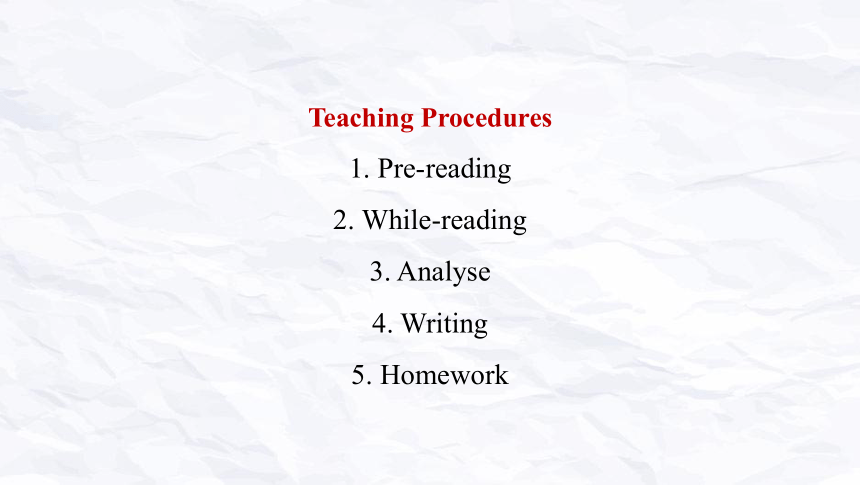
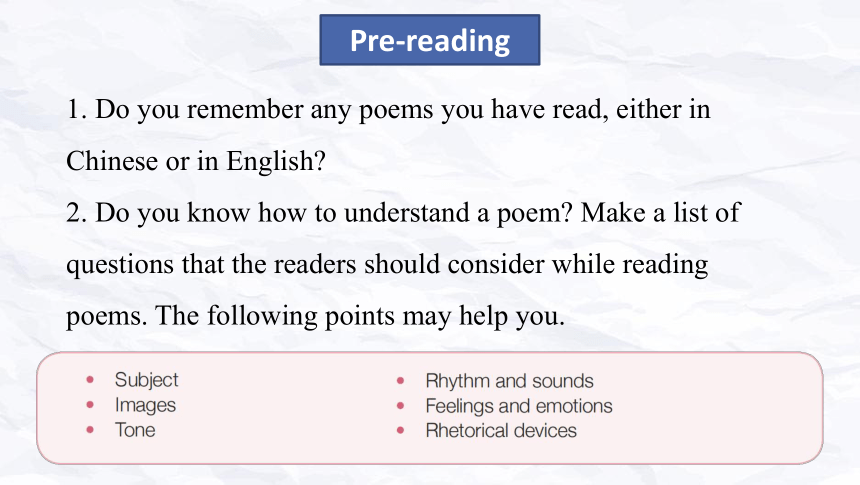
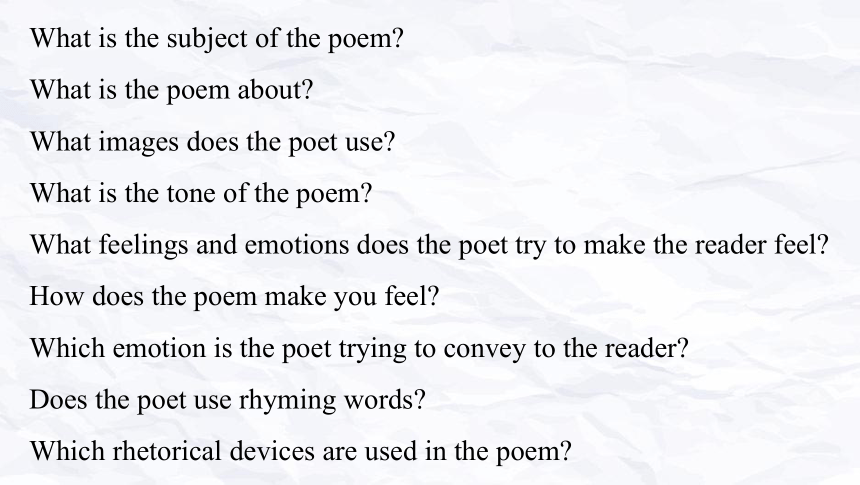
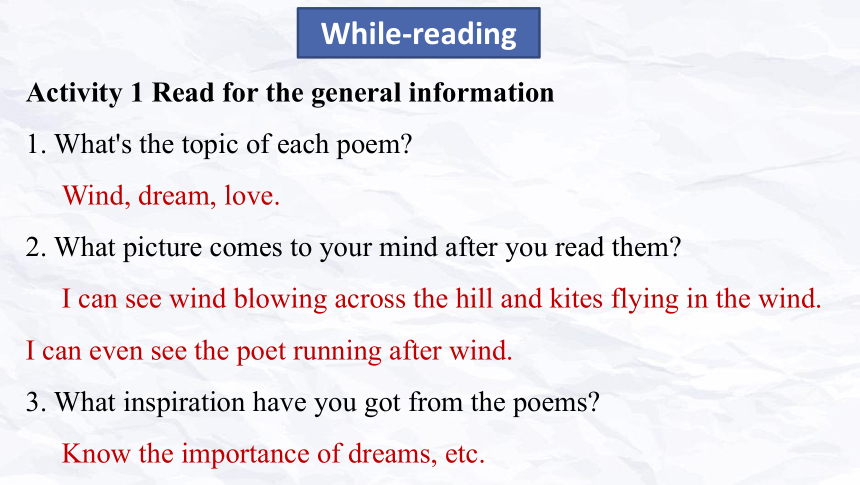
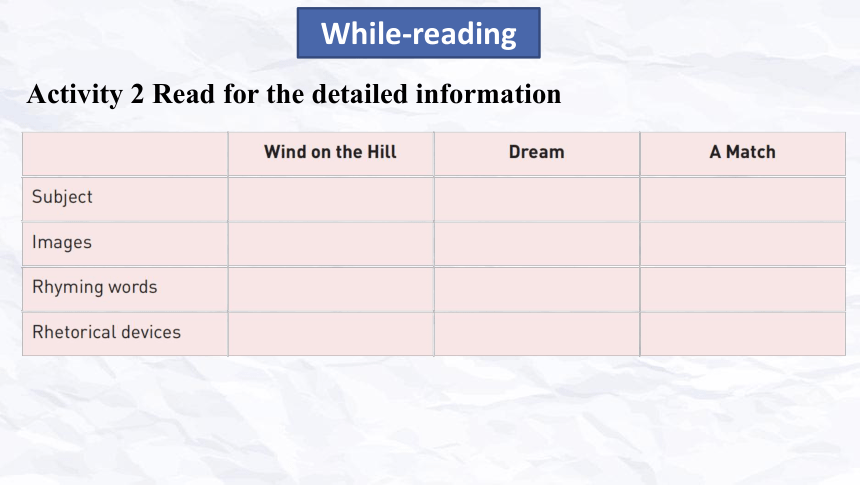
文档简介
(共15张PPT)
Poems
Reading for wiriting
Teaching Objectives
By the end of the period, students will be able to:
1. assess subjects, images, rhyming words and rhetorical devices of poems.
2. analyse and write an essay about a poem.
3. write an original poem based on what has been learnt.
Teaching Procedures
1. Pre-reading
2. While-reading
3. Analyse
4. Writing
5. Homework
Pre-reading
1. Do you remember any poems you have read, either in Chinese or in English
2. Do you know how to understand a poem Make a list of questions that the readers should consider while reading poems. The following points may help you.
What is the subject of the poem
What is the poem about
What images does the poet use
What is the tone of the poem
What feelings and emotions does the poet try to make the reader feel
How does the poem make you feel
Which emotion is the poet trying to convey to the reader
Does the poet use rhyming words
Which rhetorical devices are used in the poem
While-reading
Activity 1 Read for the general information
1. What's the topic of each poem
Wind, dream, love.
2. What picture comes to your mind after you read them
I can see wind blowing across the hill and kites flying in the wind. I can even see the poet running after wind.
3. What inspiration have you got from the poems
Know the importance of dreams, etc.
Activity 2 Read for the detailed information
While-reading
Wind on the Hill Dream A Match
Subject wind dream love
Images kite, person broken-winged bird, barren field frozen with snow rose,leaf,fields
Rhyming words knows/goes can/ran kite/might blew/too die/fly go/snow together/weather
closes/is
grief/leaf
Rhetorical devices repetition, alliteration repetition,mataphor repetition,
metaphor,simile
Analyse
Activity 1 Read the example in Activity 3 and answer the questions.
How does the author analyse the poem From which aspects
Para.1 The form of the poem (What’s the topic of the poem What kind of poem is it How do some sentences rhyme
Para.2 The __________________ of the poem.
Para.3 The __________________ of the poem.
Para.4 The __________________ of the poem.
image/picture
language/expressions
meaning/inspiration
Analyse
Activity 2 Read for language expressions
1. Read the essay again and find out the useful expressions.
Para.1 ____________________________________________________
Para.2 ____________________________________________________
Para.3 I learnt a new...
Para.4 I think the poet is...
The poem...by...is...with...lines.
When I read the poem aloud I can hear that...
These rhyming words sound...
When I close my eyes, I can see...from the poem. For example...
Writing
Activity 2 Choose one of the poems and write a short essay about it. The poem WIND ON THE HILL by A. A. Milne is a poem with 20 lines. When I read the poem aloud I can hear that the ends of some sentences rhyme "knows" and "goes", "kite" and "night". These rhyming words sound nice and make the poem pleasing to read.
When I close my eyes, I can see vivid pictures from the poem. For example, I can see wind blowing across the hill and kites flying in the wind. I can even see the poet running after wind.
The language of the poem is descriptive and vivid. I learnt a new phrase "keep up with", which means to catch something.
As far as I'm concerned, the poet is describing the beauty of wind and nature for us.
Writing
Write an original poem
1. Theme:
2. Words and Phrases:
3. Image/Picture:
4. Title:
Is the theme/subject of the poem clear
Are the words and phrases related to the theme
Does the poem paint a picture in your head
Does the poem have a proper title
Does the poem rhyme
Presentation
Homework
Write your poem
____________________________________________________
____________________________________________________
____________________________________________________
____________________________________________________
____________________________________________________
Thanks for listening!
Poems
Reading for wiriting
Teaching Objectives
By the end of the period, students will be able to:
1. assess subjects, images, rhyming words and rhetorical devices of poems.
2. analyse and write an essay about a poem.
3. write an original poem based on what has been learnt.
Teaching Procedures
1. Pre-reading
2. While-reading
3. Analyse
4. Writing
5. Homework
Pre-reading
1. Do you remember any poems you have read, either in Chinese or in English
2. Do you know how to understand a poem Make a list of questions that the readers should consider while reading poems. The following points may help you.
What is the subject of the poem
What is the poem about
What images does the poet use
What is the tone of the poem
What feelings and emotions does the poet try to make the reader feel
How does the poem make you feel
Which emotion is the poet trying to convey to the reader
Does the poet use rhyming words
Which rhetorical devices are used in the poem
While-reading
Activity 1 Read for the general information
1. What's the topic of each poem
Wind, dream, love.
2. What picture comes to your mind after you read them
I can see wind blowing across the hill and kites flying in the wind. I can even see the poet running after wind.
3. What inspiration have you got from the poems
Know the importance of dreams, etc.
Activity 2 Read for the detailed information
While-reading
Wind on the Hill Dream A Match
Subject wind dream love
Images kite, person broken-winged bird, barren field frozen with snow rose,leaf,fields
Rhyming words knows/goes can/ran kite/might blew/too die/fly go/snow together/weather
closes/is
grief/leaf
Rhetorical devices repetition, alliteration repetition,mataphor repetition,
metaphor,simile
Analyse
Activity 1 Read the example in Activity 3 and answer the questions.
How does the author analyse the poem From which aspects
Para.1 The form of the poem (What’s the topic of the poem What kind of poem is it How do some sentences rhyme
Para.2 The __________________ of the poem.
Para.3 The __________________ of the poem.
Para.4 The __________________ of the poem.
image/picture
language/expressions
meaning/inspiration
Analyse
Activity 2 Read for language expressions
1. Read the essay again and find out the useful expressions.
Para.1 ____________________________________________________
Para.2 ____________________________________________________
Para.3 I learnt a new...
Para.4 I think the poet is...
The poem...by...is...with...lines.
When I read the poem aloud I can hear that...
These rhyming words sound...
When I close my eyes, I can see...from the poem. For example...
Writing
Activity 2 Choose one of the poems and write a short essay about it. The poem WIND ON THE HILL by A. A. Milne is a poem with 20 lines. When I read the poem aloud I can hear that the ends of some sentences rhyme "knows" and "goes", "kite" and "night". These rhyming words sound nice and make the poem pleasing to read.
When I close my eyes, I can see vivid pictures from the poem. For example, I can see wind blowing across the hill and kites flying in the wind. I can even see the poet running after wind.
The language of the poem is descriptive and vivid. I learnt a new phrase "keep up with", which means to catch something.
As far as I'm concerned, the poet is describing the beauty of wind and nature for us.
Writing
Write an original poem
1. Theme:
2. Words and Phrases:
3. Image/Picture:
4. Title:
Is the theme/subject of the poem clear
Are the words and phrases related to the theme
Does the poem paint a picture in your head
Does the poem have a proper title
Does the poem rhyme
Presentation
Homework
Write your poem
____________________________________________________
____________________________________________________
____________________________________________________
____________________________________________________
____________________________________________________
Thanks for listening!
